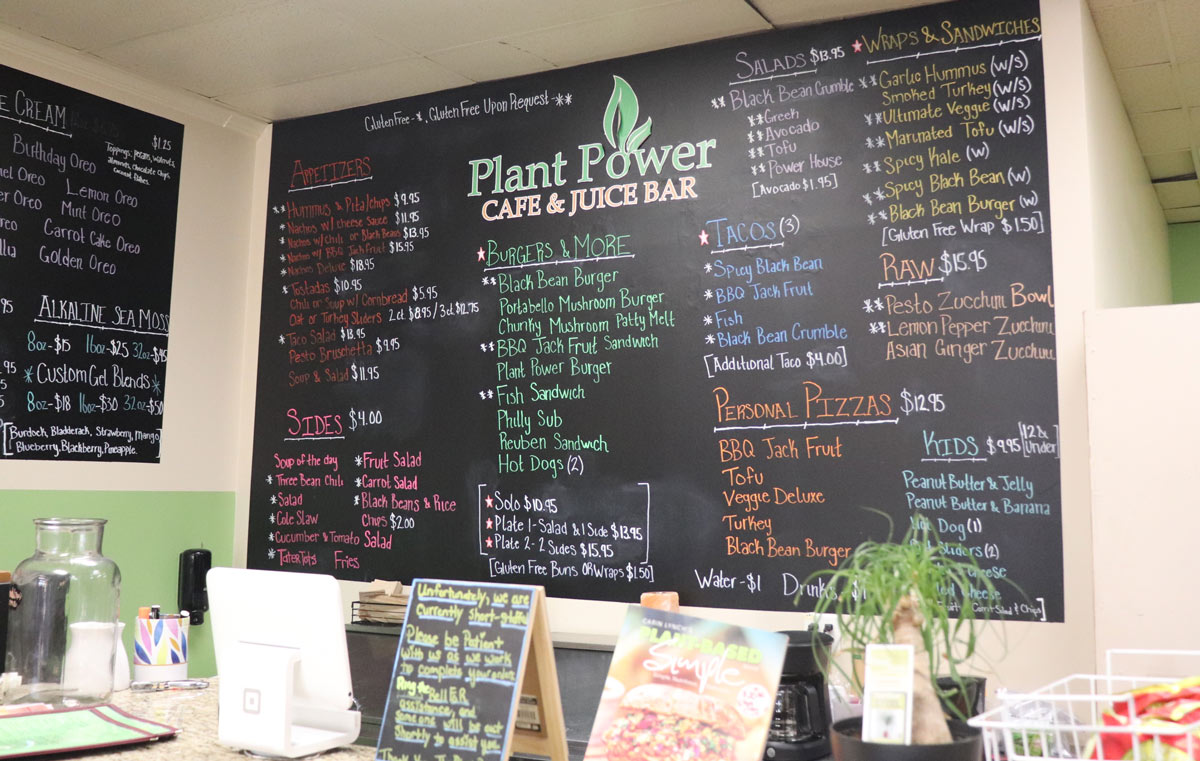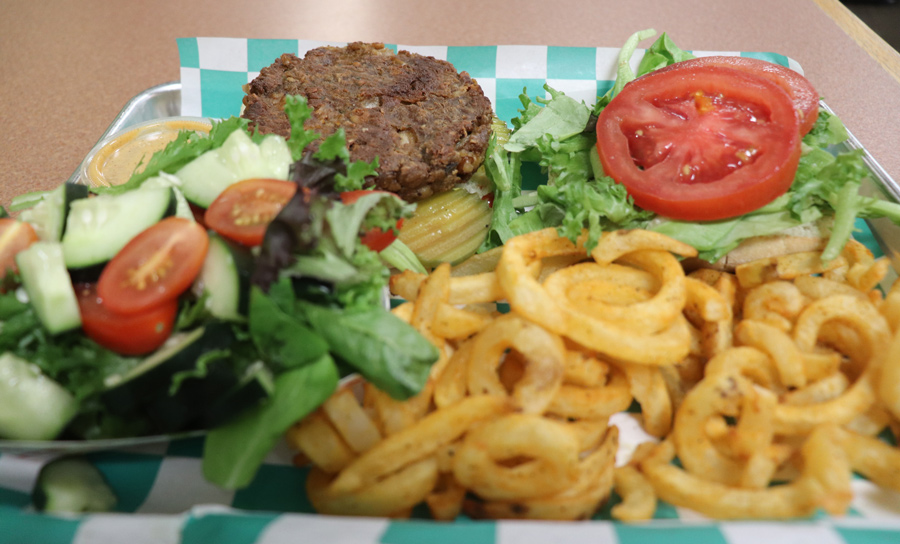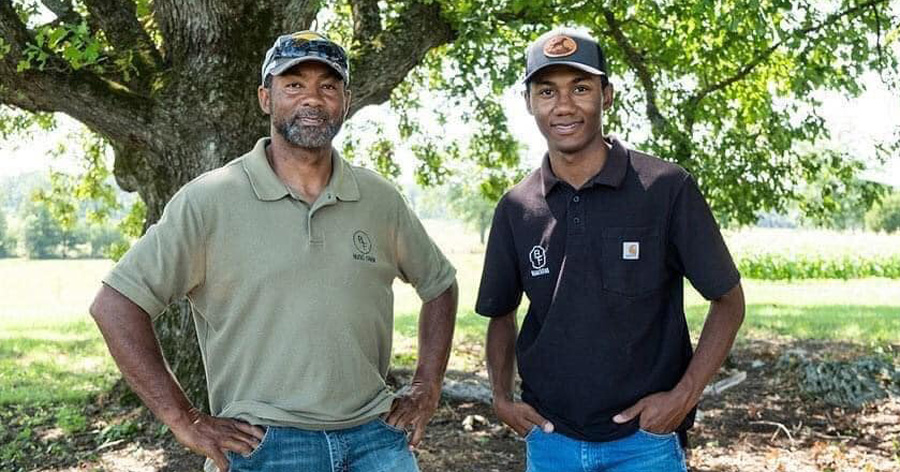

would’ve almost missed it if I hadn’t been looking. Snuggled among the smoke shops and tax service stores in the city of Chattanooga, the Plant Power Café and Juice Bar sign popped out at me with its lime green colors and bright fruits. But inside the cozy, aromatic café was an even brighter presence—the owner, Aurellia Alexandre.
She’s a short woman with colorful jewelry and an inviting smile. She made sure I was comfortable and introduced me to her children who help her run the restaurant. As we sat down to talk at one of her café booths, I noticed that behind Alexandre’s head was an impressive wall covered almost entirely by chalkboard paint. It was lined top to bottom with vast menu options. But what made her menu stand out the most wasn’t the amount of items—it was the fact that it was entirely plant-based or vegan.
This little vegan eatery almost doesn’t belong with other restaurants on this street. McDonald’s, Burger King and Taco Bell line the road directly in front of it, and further down are several fried chicken restaurants. In fact, the sheer number of fast-food places in the surrounding area point to a bigger problem that sits only a few miles down the road—a food desert.
A food desert is defined by the USDA as a low-income area that stands more than 1 mile (if urban) or 20 miles (if rural) from the nearest supermarket. With low access to supermarkets, comes low access to fresh produce and other healthy eating options. Ironically, most people in food deserts eat mostly junk food and therefore suffer from higher obesity rates. While the area surrounding Power Plant Cafe has it slightly better (the nearest supermarket is roughly half a mile away), just a couple of miles down the street is a food desert. In 2020, local news reported that Alexandre’s city of Chattanooga had nearly 30,000 people living in food deserts.
Unfortunately, inhabitants of racial and ethnic minority neighborhoods are the most likely to not have access to healthy food. In fact, the USDA found that generally speaking, the higher the percentage of minorities, the more likely an area will be a food desert. This combination of low income and lack of quality diet sets many minorities up for some serious health problems. In fact, in 2018 the Office of Minority Health found that non-Hispanic blacks were twice as likely as non-Hispanic whites to die from diabetes. The Cleveland Clinic reports that black men and women are 70% and 50% (respectively) more likely to suffer heart failure than their white counterparts. They also report that black adults are the most likely racial and ethnic group to die from stroke.
But a healthy plant-based diet has been shown to lower the risk of all three diseases. Perhaps that is why there has been such an upsurge in plant-based diets in the black community. In 2016, Pew Research Center found that 8% of African Americans were strict vegans or vegetarians, compared to only 3.4% of the general population. This parallel’s the BBC’s later report that black people were nearly three times as likely to be vegan when compared to white people. Black celebrities like Tabitha Brown have even become famous for their plant-based lifestyle.

“A lot of [our customers’] doctors send them here…We get people [that] come in and say, ‘Well, my doctor told me I need to go plant-based’ to try to reverse diabetes or get their cholesterol level down,” Alexandre said.
Of course, switching to a plant based diet, especially so suddenly, can be difficult. So Alexandre has worked hard to offer a large variety of plant-based food options to her customers. When she began Plant Power Café and Juice Bar in 2016 with her brother Rony, the first recipe they came up with was their black bean burger. It was followed shortly by a barbecue jackfruit sandwich and seven years later the menu is populated by over 50 recipes.
And let me be clear—the food is good. Vegan food is stereotypically thought of as tasteless and stomach churning, but sitting across from Alexandre, they served succulentgluten-based turkey bites, a luscious garlic vinaigrette side salad, and the flavorful tofu and oat based Plant Power Burger. For dessert, I was treated to a tender peanut butter and jelly bar that was not only mouth watering but filling. Plus, Alexandre keeps it affordable—the entire meal only cost me about $20.
But Alexandre hasn’t stopped at food when it comes to serving her community. In recent years, she established a wellness center next door to the restaurant. There they host yoga classes, cooking classes, massages, yoni steaming, and sell oils and supplements. In another swing against the food desert surrounding her, Alexandre has set up what she calls a “Community Care Cabinet.” Stationed just outside the restaurant and painted with a bright summer sky and garden, the cabinet is designed specifically with the homeless population in mind. It holds free packaged food they can take as well as “plant bucks” that can be redeemed inside the restaurant for a free hot meal.

But sometimes the best help is the one that people can give themselves. Partnering with neighbors to do community gardens is a great start. Reaching out to local farmers to bring their markets to neighborhoods or speaking with local elected officials on the matter opens the pathway to new ideas that can save lives.
Like Alexandre and her family, we must work together. By collaborating, the Alexandres have managed to save their own health and start saving their neighborhood’s. Imagine what could be done if we all fought as hard for the gift of health. Not just for ourselves, but for our community.
- About 23.5 million people live in food deserts, and 11.5 million of them have low incomes.
- It’s possible that food deserts are under-reported, since small grocery stores that primarily sell packaged foods are often categorized with whole foods stores or supermarkets with produce sections.
- People living in the lowest socioeconomic status areas have 2.5 times the exposure to fast food restaurants than those living in wealthy areas.
- Food insecurity is highly correlated with high diabetes rates. For example, Chicago food deserts have twice the rate of death from diabetes than areas with grocery store access.

The current Mr. Bugg has diverse investments growing on his farm. He grows the usual crops like corn, watermelon, collards, zucchini, squash and cabbage. But he also has livestock and about 100 acres of pines for lumber.
Unfortunately, black farmers like Bugg are becoming increasingly rare. Research from McKinsey & Company showed that black farm operators have dropped from 925,710 (14%) in the early 1900s to 48,697 (1.4%) in 2020. These same researchers found that a farming career could have many advantages for the average black family, including a 25% median income increase.
So why aren’t there more black farmers? Bugg has his theories.
“It’s not an easy job,” he said. “It’s not a clean job. It’s [an] around the clock and around the year job. And it’s a lot of hard work, and a lot of hot days and dry days…and then you have the challenges. No rain in the forecast for two or three months sometime[s].
“And if you don’t have a system where you can provide water to your plants, then you have lost your crop. And that has happened to me several times,” he added. “I have lost my crop. But I’m still here, where[as] a lot of families… tried it and just could not could not go a year without a paycheck. That’s kind of tough. Not everybody can do that.”
But Bugg said the job also has benefits, like the natural exercise, healthier food, and a therapeutic sense that comes with farming.
“I was in the military,” he said. “I am not diagnosed with traumatic brain injuries…[or] PTSD. But the farm life is…a sense of therapy for me.”
And if you ever get to speak with Addis Bugg, you’ll hear the peace in his voice and know just how beneficial farming can be. Maybe it’s time to return to that life.
